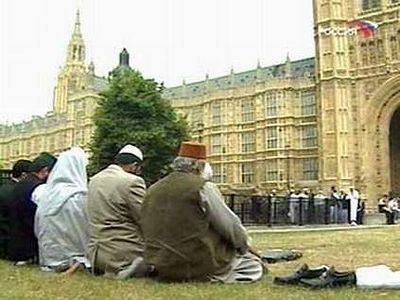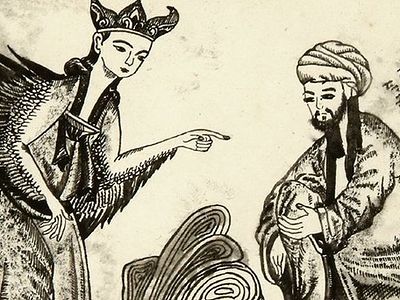Source: Valley News
By Ishaan Tharoor
The tiresome debate over whether Islam is somehow more violent than other religions unfortunately won’t go away. Recent spats between outspoken commentator Reza Aslan, TV host Bill Maher and neuroscientist Sam Harris — who said on Maher’s show that Islam was “the mother lode of bad ideas” — have launched a thousand blog posts and vitriolic tweets.
Writing in The Washington Post’s opinion pages, Fareed Zakaria acknowledged the existence of an unpleasant level of intolerance in some Muslim-majority countries, but stressed such societal ills can’t be laid at the feet of a whole religion. “So, the strategy to reform Islam,” Zakaria asks Maher, Harris and their supporters, “is to tell 1.6 billion Muslims, most of whom are pious and devout, that their religion is evil and they should stop taking it seriously?”
The backdrop to this conversation is the U.S.-led war effort against the extremist militants of the Islamic State, as well as the continued threat of terrorist groups elsewhere that subscribe to certain puritanical forms of Islam. Their streak of fundamentalism is, for the West, the bogeyman of the moment. But many argue it has little to do with Islam, writ large.
In any case, Islam and those who practice it were not always perceived to be such a cultural threat. Just a few decades ago, the U.S. and its allies in the West had no qualms about abetting Islamist militants in their battles with the Soviets in Afghanistan. Look even further, and there was a time when a vocal constituency in the West saw the community of Islam as a direct, ideological counter to a mutual enemy.
Turn back to the 1830s. An influential group of officials in Britain — then the most powerful empire in the West, with a professed belief in liberal values and free trade — was growing increasingly concerned about the expanding might of Russia. From Central Asia to the Black Sea, Russia’s newly won domains were casting a shadow over British colonial interests in India and the Middle East. The potential Russian capture of Istanbul, capital of the weakening Ottoman Empire, would mean Russia’s navy would have free access to the Mediterranean Sea — an almost unthinkable prospect for Britain and other European powers.
And so, among diplomats and in the press, a Russophobic narrative began to emerge. It was ideological, a clash of civilizations. After all, beginning with the Catherine the Great in the late 18th century, the Russians had framed their own conquests in religious terms: to reclaim Istanbul, once the center of Orthodox Christianity, and, as one of her favorite court poets put it, “advance through a Crusade” to the Holy Lands and “purify the river Jordan.”
That sort of Christian zeal won little sympathy among other non-Orthodox Christians. Jerusalem in the 19th century was still the site of acrimonious street battles among Christian sects, policed by the exasperated Ottomans. Russian Orthodox proselytizing of Catholics in Poland infuriated European Catholic nations further west, such as France.
Baron Ponsonby, the British ambassador to Istanbul for much of the 1830s, decided the job of thwarting Russian expansionism was a “Holy Cause.” An article in the British and Foreign Review pamphlet, circulated in Britain in 1836, saw the Ottomans as “the only bulwark of Europe against Muscovy, of civilization against barbarism.” Russia represented, in some accounts, a backward, superstitious society where peasants still labored in semi-slavery and monarchs ruled as tyrants, unchallenged by parliaments and liberal sentiment. The Ottomans, who were embarking on their own process of reform, looked favorable in comparison.
David Urquhart, an enterprising agent who served a spell with Ponsonby in Istanbul, became one of the most energetic champions of the Ottoman cause and Islamic culture in British policy circles. His writings on the threat of Russia shaped the opinions of many in Britain at the time, including a certain Karl Marx. And Urquhart’s time spent among the tribes of the northern Caucasus set the stage for decades of romantic European idealizing of the rugged Muslim fighters in Russia’s shadow.
Urquhart returned from his travels in Turkey and elsewhere convinced that the Ottoman lifestyle was better for one’s health. “If London were Muslim,” he wrote, “the population would bathe regularly, have a better-dressed dinner for its money, and prefer water to wine or brandy, gin or beer.” He would later launch a largely unsuccessful movement to bring the culture of Turkish baths to the cold damp of Victorian Britain.
Casting his eye to the territories the Ottomans controlled, Urquhart praised the empire’s rule over a host of Christian communities — for example, the warring Druze and Maronites in the Levant, or feuding Greek Orthodox and Armenians. In a passage cited by the historian Orlando Figes in his excellent history of the Crimean War, Urquhart credits Islam under the Ottomans as a specifically “tolerant, moderating force”:
What traveler has not observed the fanaticism, the antipathy of all these Christian sects — their hostility to each other? Who has traced their actual repose to the toleration of Islamism? Islamism, calm, absorbed, without spirit of dogma, or views of proselytism, imposes at present on the other creeds the reserve and silence which characterize itself. But let this moderator be removed, and the humble professions now confined to the sanctuary would be proclaimed in the court and the military camp; political power and political enmity would combine with religious domination and religious animosity; the empire would be deluged in blood, until a nervous arm — the arm of Russia — appears to restore harmony, by despotism.
Flash forward to 2014, and the conversation has curiously flipped: Pundits bluster about the centuries-old war between Sunnis and Shiites. Christians are a persecuted, beleaguered people in the Middle East. Without ruthless strongmen aligned with the West, we’re told, the Muslim world would descend into a chaotic bloodbath where terrorist organizations would gain sway.
This history lesson is not meant to denigrate the Russians and praise the Ottomans, an empire that was guilty of many of its own misdeeds and slaughters. Urquhart himself had plenty of detractors and opponents back home, particularly those who wanted Britain to be less openly antagonistic toward Russia. (Russia, the Ottoman Empire, Britain and France eventually engaged in the largely pointless and very bloody Crimean War in the 1850s.)
But it goes to show how much the politics of an era shape its conversation about cultures and peoples. That’s no less true now than it was almost two centuries ago.
Ishaan Tharoor writes about foreign affairs for The Washington Post.




